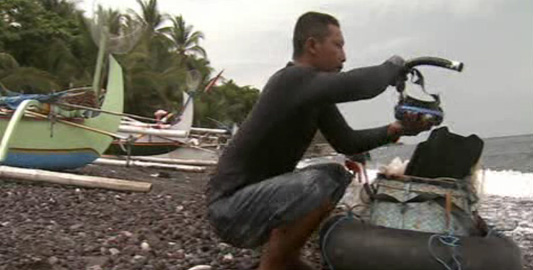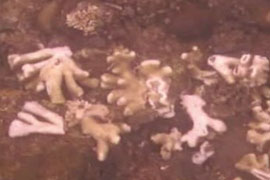Indonesia’s coral crisis
Climate change is killing the unique ecosystem off Bali’s coast.

 |
| Nengah Arsana used to use cyanide to help him catch fish off Bali’s northern coast |
As thousands of delegates, experts and activists debate global climate change, on the Indonesian island of Bali the coral reefs that surround it are dying.
Al Jazeera’s Step Vaessen travelled to the north of the host island to find out the situations is effecting Bali’s fishermen.
Keep reading
list of 4 itemsLost Futures
Photos: Greek valley that became a lake stirs drought debate
Botswana threatens to send 20,000 elephants to Germany
There was a time when Nengah Arsana would take cyanide with him when he went out fishing. The poison would sedate the fish and make them easy to catch.
But when the coral started to die and the fish disappeared, he realised that something was going terribly wrong. The whole fishing community lost its livelihood and decided to change its habits.
“Now we protect our corals by just using nets for fishing because we realise that fish can’t live without coral,” he told Al Jazeera.
“Since we have stopped using cyanide, our business has picked up again.”
The fishermen in Les in northern Bali catch tropical fish, usually for export.
Coral rehabilitation
With help from a coral-rehabilitation programme, the habitat of the fish has grown back and the fishermen have become coral experts.
With simple means like concrete and a brush, they managed to restore parts of the reef.
|
Your Views |
|
Mohamed Hassan, Somalia |
“We have to clean the replanted corals with a brush,” Eka, another fisherman, said.
“It’s important to do this very gently, otherwise the coral will be stressed.”
The fisherman have realised the need to protect the coral to protect their livelihoods. But if the reef is damaged by climate change, there is nothing they can do about it.
Charlie Veron, former chief scientist of the Australian Institute of Marine Science, told Al Jazeera that coral was the first ecosystem taken out when the climate turns bad.
“In all five of the world’s great mass extinction events, it is coral reefs that have gone first and have been hit hardest, taking up to 10 million years to recover,” he said.
“The coral reefs have been giving us an early warning, and they have been giving us this for close on 20 years, that all is not well and it is rapidly getting worse.
“There won’t be very many corals left if we don’t change our ways and stop producing carbon dioxide.”
A temperature rise of just one degree Celsius can bleach coral and kill it.
Disappearing reefs
The environmental group Greenpeace says that 20 per cent of the world’s reefs have already been destroyed, while a further 50 per cent are under either imminent or longer term risk of collapse.
 |
| Scientists predict that the world’s coral reefs could completely disappear by 2100 |
Scientists predict that the world’s coral reefs could completely disappear by 2100.
On the bottom of the ocean north of Bali, the evidence of global warming is painfully visible, and for the environmental group which helped the fishermen of Les restore the reef, this is a tragedy they are unable to stop.
“We cant solve this on a local level. This is a global issue. If the climate change continues, all our efforts will be in vain,” Wirasan Jaya, an environmental worker, said.
The marine ecosystem here is under threat, and with it the future of the people.
Nearly one-third of the Balinese will loose their livelihoods if the coral reefs are destroyed and across the whole of Indonesia millions of people living on the coast will be affected.